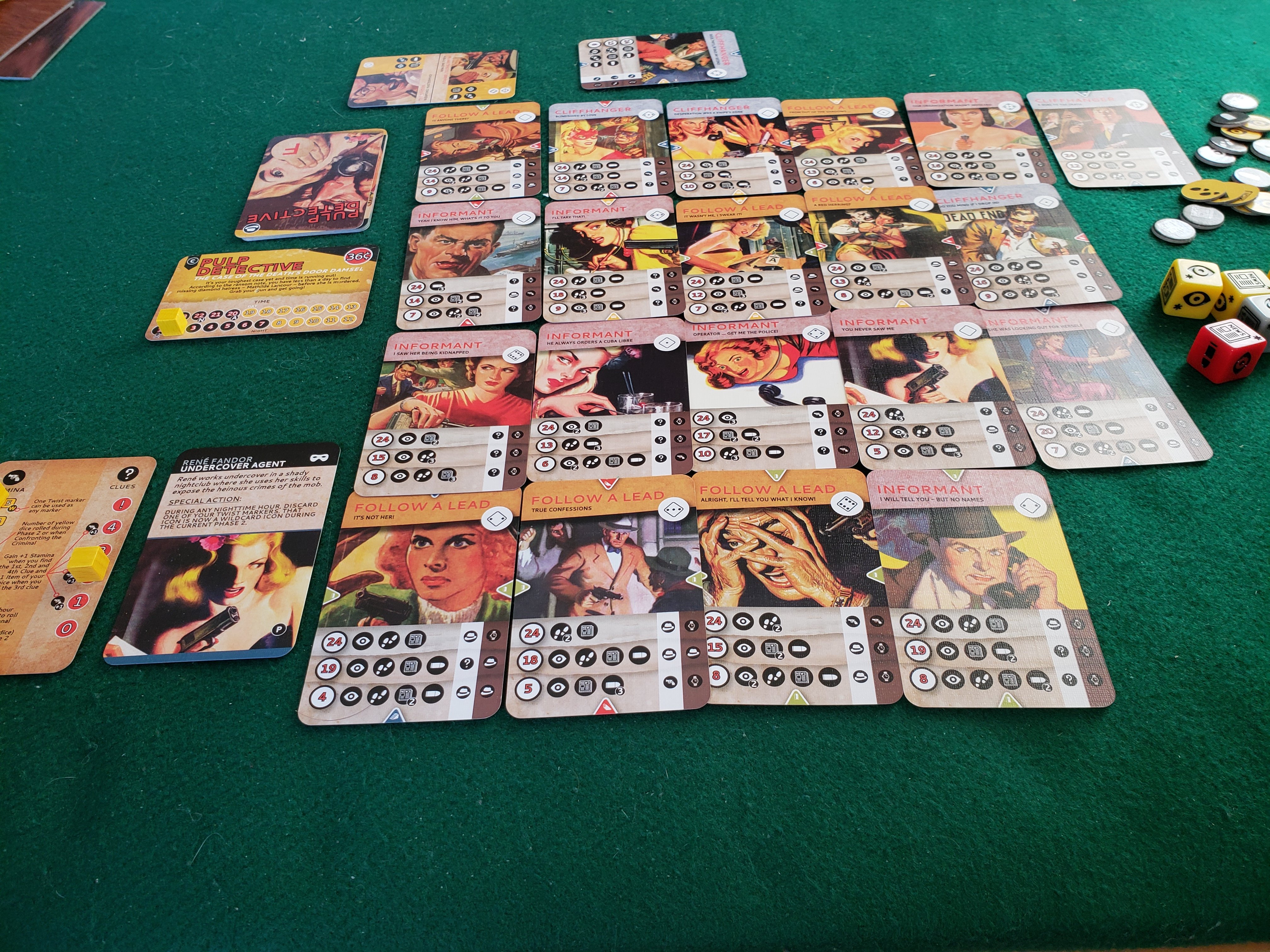

Pulp Detective — a review
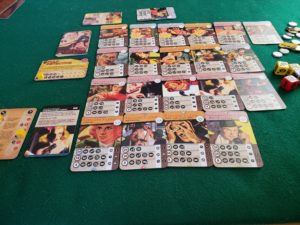
Pulp Detective is a solo card and dice game set in the mystery/detective genre of the 1930-40s The art work is very thematic and reminds me of comics like The Shadow.
The setup is easy. You pick a detective from a list of characters. Each detective has a unique special power that you can use during play. You have two other cards: one tracks which item is in your inventory and the other tracks stamina (aka health) and how many clues you have found.
You have a set number of hours to collect enough clues to confront the villain and solve the crime. At the start of the round you select three cards from the investigation deck face down and pick one to play, one to discard, and one to put back into the deck. There are three types of investigation cards and each type has a probability to grant specific rewards if you succeed.
The card you play has a task (much like Elder Sign or Five Year Mission) that you use the dice to roll the correct symbols. Here’s one of the tricks of this game: the dice have non-standard faces. Each die has a multiples of the same symbol (e.g. the two eyes and two newspaper die) but each die is unique so pick which die to roll carefully.
Impressions and game play thoughts
This game is super difficult. There is a lot of randomness in how the cards come out of the deck and what symbols turn up when you roll. There’s a merciful mechanic where if you fail a card task you can take a token that counts for one of the dice faces you did roll during the attempt. If you are successful and don’t need to roll all your dice on a card you can peek at the three cards that come at the start of the next round. You need to pay close attention to the time tracker and take care picking what type of card to put into play each turn. My first game I just grabbed whatever looked good and lost very quickly.
The game is thematic and feels like an old Humphrey Bogart movie as you rough up an informant, then have a shoot out, then find a tied up dame who has a clue for you. It’s just I had a terrible run of luck with the dice and could not get enough clues to find the bad guy for the final conflict. I do look forward to trying until I solve the case. The core game has three cases in the box.
Origins vs. GenCon
A few folks have asked me about conventions in general and GenCon in particular. I wanted to share my impression about the two summer time shows in the mid-west.
First GenCon. It is big and crowded and expensive. It’s the “best four days in gaming” because it is the primary show in the U.S. for most publishers to make big product announcements and releases. Paizo, Asmodee, Arcane Wonders, Fantasy Flight, Upper Deck, and all the other industry leaders bring new and exciting things to GenCon every year. It makes sense, this is where those companies can get the most exposure for their products. The exhibit hall is enormous and packed full of all sorts of vendors. It takes a full four days to visit all the booths and attend sessions and play games. There is almost too much stuff going on.
Origins is smaller with fewer vendors and a few new products. Since Origins happens at the start of summer a lot of companies do teaser releases or have demos of games they hope to have ready for GenCon. You can make it around the exhibit hall in single day and have plenty of time to play games. The show is easier to get to and less expensive (parking, hotels, etc.) but downtown Columbus has less to offer than downtown Indy. However I tend to find my way into the German village and grab a creme puff at Schmitd’s while I’m attending.
Which Con is right for you? If you don’t mind crowds and waiting in line and want to see the hot new releases of the year and wish to attend panels with the designer/editor/authors then you are headed for Indy and GenCon.
If you don’t care much for crowds and want a more relaxed experience Origins is fantastic. I got to talk with designers at Origins who were simply too busy at GenCon either talking briefly to the many fans in line or out of their booth in meetings.
Gencon 2018
This year I had the great luck to be near Indianapolis during the best four days in gaming and I attended my 5th GenCon. Lot’s of exciting things happened while I was there. The short version is I met much of the development team from White Wolf and picked up Vampire 5th edition and got swept away in the energy at Goodman Games and discovered Dungeon Crawl Classics.
Origins Game Fair
This Sunday I got to visit the Origins Game Fair in Columbus Ohio. This is a four day convention about card, board, and role play games. There are competitions and tournaments for games like Magic the Gathering, Settlers of Catan, and others. The schedule is packed full of things from early in the morning until very very late at night.
I did not attend any of the paid game sessions, nor did I get to attend the evening sessions since I only had Sunday. There are a bunch of things to do and see outside the exhibit hall, but I didn’t do or see anything like that this trip. I had thought about trying to get in Saturday for a session of Pathfinder 2.0 or one of the evening learn to play (Malifaux or 40k) but schedules just did not work in my favor.
This was my second trip to Origins. Last year I went up on a Saturday and wandered around and got into a game of Small World. This year I did a bunch of demos in the exhibit hall. I find Origins to be just about the right size for me. There is plenty of things to see and do but it is seeable and doable. I drove into town and parked and that was easy with plenty of parking open at 8:30AM. When I left the con at 4:30 PM the traffic around the convention center was quite managable. None of the booths felt cramped, none of the common areas were packed and none of the food venues were swamped. It was all very chill.


Photosythesis – a review
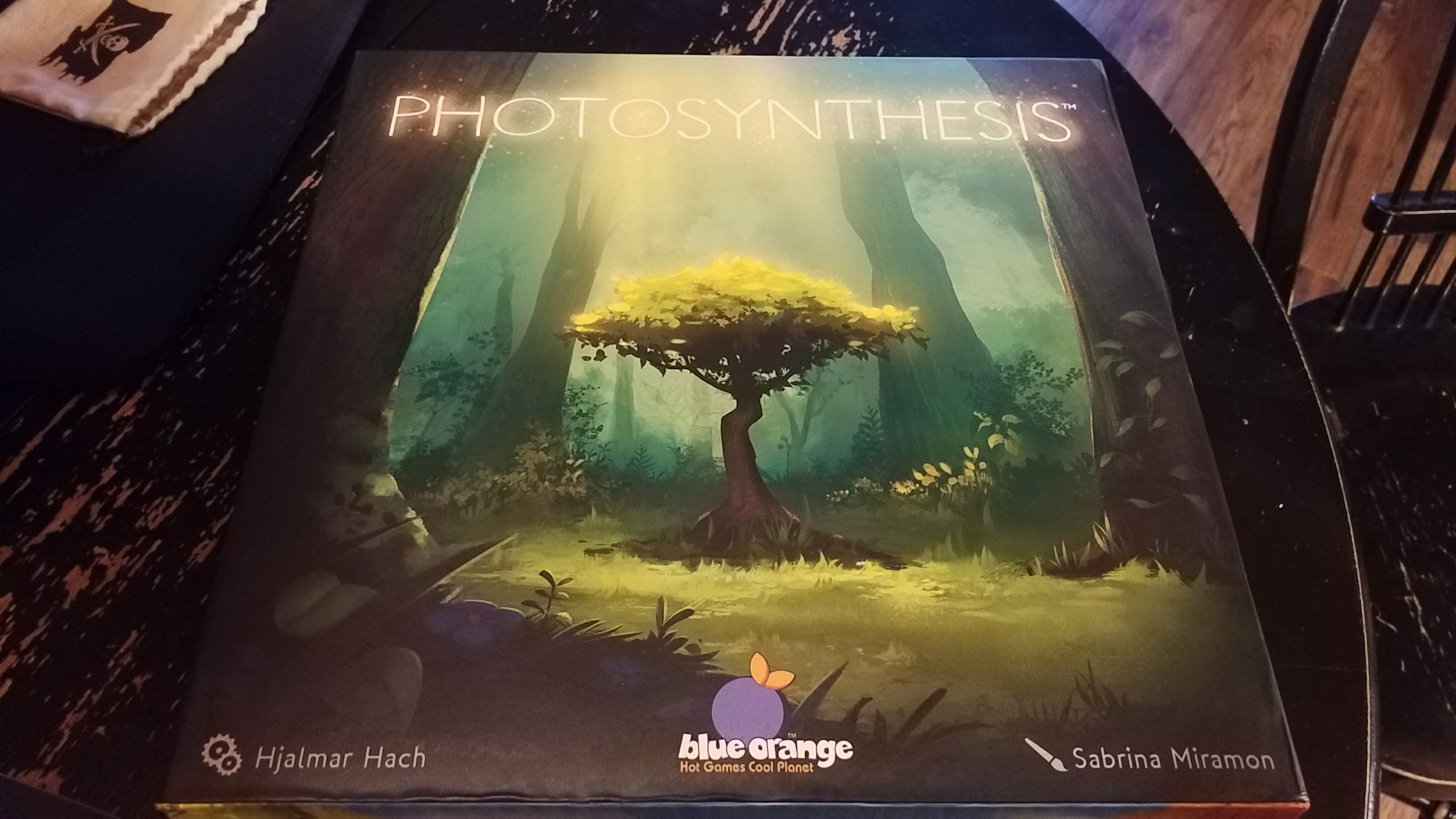 The abstract tree growing and harvesting game from Blue Orange is not something that I would have normally picked up. It’s a game about growning trees. Every once in a while I find a game that is outside my normal fare (pirates, Cthulhu, space conquest, fantasy combat) that I find fun and fresh. Photosythensis is in this club.
The abstract tree growing and harvesting game from Blue Orange is not something that I would have normally picked up. It’s a game about growning trees. Every once in a while I find a game that is outside my normal fare (pirates, Cthulhu, space conquest, fantasy combat) that I find fun and fresh. Photosythensis is in this club.
GenCon 50
This year was the 50th anniversary of GenCon and it was a large and amazing trip. We went out for all four days and managed to try some new things. I played my first convention RPG session, the Starfinder test game. It was not bad but it did feel a bit off. We played a much more mechanical combat mission. With the mat and miniatures it felt more like a board-game than a true RPG experience. It was hard for me to build rapport with stranger so that I could play my character’s personality beyond the archetype.
Another new experience this trip was eating from the food trucks and drinking in the beer tent. In years past we’ve had minors in tow and it was difficult to try these things. The Sun King beer was very good and the wait for dinner was not terrible. The people in line were friendly and the food was very tasty.
The expanded exhibit hall was still very cramped. It could have been the record attendance but the experience matched years past with being bumped and jostled and slowly wading through people to get anywhere. The stadium display of GenCon’s history was very well done and I hope GenCon continues to move more things into the stadium in future years.
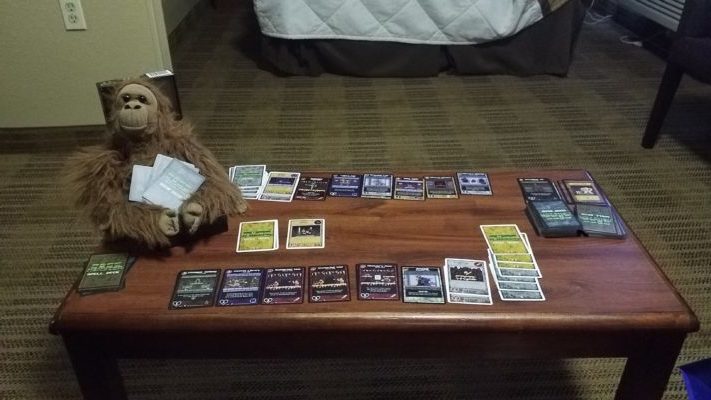

Boss Monster – a review
Boss Monster is a card game where the players take the roll of a villian from an 8 bit side scroller video game. You build a dungeon with monsters and traps. You lure adventurers into your lair and hopefully they expire before reading your chamber. The first to collect 20 souls wins If you get hit with 5 wounds from adventures who proved too hearty to sucumb to your designs you lose.
This is an easy game to learn/play. You setup by taking a monster, five room cards and two spell cards. You then display adeventurers (one per player) and then you pick a room to build, laying the card face down. You reveal your room simultaneously with the other players and put it in your dungeon. At the bottom of each room card there are helpful icons that tell you what type of adventurer you attract: swords for fighters, books for mages, holy symbols for clerics and money bags for thieves. You count the number of icons on the bottom of the room cards you have in your dungeon and that’s who you attract. If there’s a tie then the adventure decides not to adventure this turn and stays in town.
There are two levels of rooms: basic rooms and advances rooms. You can tell the difference by a small icon in the upper left-hand corner of the card. silver is used to show basic level rooms. Gold is shown for advanced level rooms. There are also classes of rooms the two most common being monster and trap. Trap rooms have a skull and crossbones and monster rooms have a monster face.
During the during the game you can build at most five rooms. To build an advanced room you have to put it on top of a pre-built basic room. The icons at the bottom has to match in order to build on top of a basic room; so if a basic room has a book for the mage you can build any of the advanced rooms that have the book icon on top of that basic room.
Each room deals damage which is noted on each room deals damage which is noted on the card in a heart. You’re trying to build the most dangerous dungeon so that you can “deal with” adventures.
The most interesting things about this game is the artwork which on the surface looks blocky and pixelated following along on that 8-bit video game theme. What you see if you look at more of the cards are references to all sorts of things. There’s a statue that looks like the front of the player’s handbook from Dungeons & Dragons, the liger makes an appearance from Napoleon Dynamite and there’s even a blue eyes white dragon look alike. Playing the game is fun simply to just look at the cards and see if you can connect the artwork with either a video game or other pop culture references
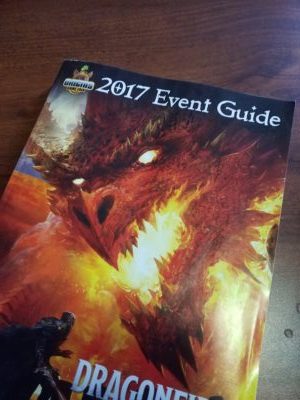

Origins 2017
This was my first trip to the Origin’s Game Fair in Columbus Ohio. This convention is smaller than GenCon with fewer exhibitors and much wider asile space in the exhibit hall. There were many great demo spaces for trying out games. I went for just Saturday during the day.
I didn’t attend any scheduled events; to be fair, I didn’t do a lot of research on what seminars were available, but the whole convention felt more like a place to play games rather than buy games or attend paid seminars. Origins definitely had less of a commercial vibe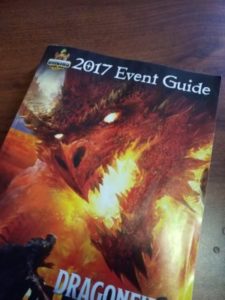 .
.
I found it quite nice to have an exhibit hall that I could explore and feel like I saw everything that I wanted to see. I left Origins with a feeling that I had seen what was there and I didn’t have any underlying concern that I had missed a vendor or missed out on seeing a game and that was a nice feeling.
I didn’t I didn’t stay in a hotel and since I only went one day I don’t have a good price comparison between Gen Con and Origins. I would attend Origins again it was a lot of fun with a lot less pressure and people and crowds.
The Grizzled with expansion and still no W
We tried the Grizzled with the expansion and it was a better experience. The new mission deck mechanic is good for taking pressure off the mission leader and makes each mission unique. Keeping speeches and a more forgiving lucky charm reset does a lot to help make the game feel more winnable.
We lost. It was the very last mission and we might have won but we couldn’t finish the mission and the threat deck ran out. I can see us winning next time.
Solo games becoming more popular
Lately I have noticed that many new boardgames are including a solo option for play. This is good news for those of us who do not have a large gaming community or for those times when you just want to sit and play and everyone else is busy.
The solo games that I’ve been playing are: Robinson Crusoe, Battle for Greyport, and of course Mythos Tales.
Solo game are great for entertaining yourself and getting a board game experience without having to wait for other people. I’m surprised at how theme and style can shape the experience between games. Mechanically most solo game are the same: draw some cards, roll some dice, review the results, repeat.
The nice thing about a well put together solo game is that the theme comes through and you feel like you are exploring a deserted island, or fighting off an invasion force, or tracking down a mystery. Many solo games are great at this.